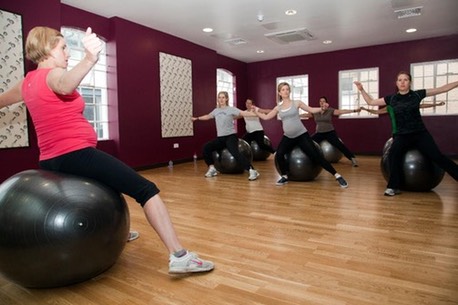Local Mum and antenatal fitness specialist Orla O'Doherty blogs for us on keeping fit and exercising during pregnancy

Keeping ‘Maternally Fit’
Why you need to read this post
According to a study in the British Journal of Sports Medicine1, a high proportion of pregnant women follow neither physical activity nor exercise guidelines. This puts them at increased risk of many pregnancy-related diseases2. But part of the problem is that most mums to be don’t know what exercises they should be doing during pregnancy. Here, we pull together some of the most frequently asked questions with the latest research to give you the answers you’ve been looking for and help you take your first steps to a fitter, healthier pregnancy3.
Why do I need to stay fit during pregnancy?
-To manage weight gain
Excess weight gain during pregnancy can increase the risk of gestational diabetes, high blood pressure, a longer labour, caesarean section, delivering large babies and difficulty losing weight after delivery. While research results differ, several studies show that women who exercise in pregnancy are less likely to gain excess weight during pregnancy3.
-To stave off depression
Higher levels of physical activity and exercise are generally associated with lower risk of depression which, during pregnancy, is associated with an increased risk of poor birth outcomes3.
-To reduce your risk of pre-eclampsia
Whilst the cause of pre-eclampsia (a potentially serious condition that affects some pregnant women) is unclear, one risk factor is lack of exercise. Most studies looking into the effect of exercise on the rate of pre-eclampsia demonstrate benefit3.
-To improve your bladder control
Weakening of the pelvic floor muscles during pregnancy and delivery can lead to bladder leakage. However, studies show that reduced bladder control improves with antenatal pelvic floor muscle training3.
-To help you stay upright
Though it is yet to be studied in a research setting, it is thought that exercise in pregnancy may reduce the risk of falling3.
-To keep fit
Last but most obvious! Exercising in pregnancy allows you can maintain or even improve your aerobic fitness and strength3.
I haven’t done much exercise in a while, is it safe to start exercising now that I’m pregnant?
If you haven’t done regular exercise for a while, you should start slowly and build up gradually. If you’re attending a class, it’s important that the instructor knows your pregnant and is properly qualified4.
When’s the best time to start exercising in pregnancy?
The sooner you start the better. This gives you plenty of time to improve your fitness and take advantage of all the benefits of exercise.
Is there a point in my pregnancy when it’s best to stop exercising?
You should stop exercising f you experience vaginal bleeding, regular painful contractions, shortness of breath at rest, dizziness/light-headedness or your waters break3. Otherwise, you can continue to exercise as long as you feel comfortable.
Will exercising in pregnancy harm my baby?
Light to moderate physical activity doesn’t increase your risk of miscarriage or premature labour and may perhaps decrease it. Exercising at a very high intensity can lower your baby’s heart rate temporarily. It quickly returns to normal at rest and there are no reports of any permanent impact on the baby3. Most pregnancy exercise programs are set at a moderate intensity.
Are there any reasons why I might not be able to exercise during pregnancy?
There are some conditions that might mean you aren’t allowed to exercise during pregnancy. These are usually conditions that are affecting your breathing or circulation, the position of the placenta or your baby’s size. If you have any of these problems, your midwife or consultant will advise you against exercising.
Will exercising in pregnancy make labour more difficult?
Some women worry that strong pelvic floor muscles might make labour longer or more difficult but there is no evidence to support this theory3. In fact, exercise in pregnancy may be associated with a shorter first stage of labour.
Are there any exercises I should avoid during pregnancy?
Pregnant women are often advised to avoid any sports or exercise where there may be collision or sudden deceleration such as horse riding or skiing. It is also advisable to avoid scuba diving. Exercising on your back may cause a drop in blood pressure. If you feel the symptoms of low blood pressure, such as light-headedness, when lying on your back, it is advisable to avoid exercising in this position.
What about after I’ve had my baby?
You can start some basic exercises, such as pelvic floor exercises, as soon as you feel ready. Once you’ve had your ‘GP check’ (at about 6-8 weeks after delivery) you can start doing a bit more. As in pregnancy, it’s best to start slowly and build up gradually.
How can Maternally Fit help?
Maternally Fit conducts exercise classes for pregnant and post-natal (after birth) women. All classes are conducted by a Physiotherapist with specialist training in exercise for pregnancy and the post-natal period.
Our classes are appropriate for both the novice and experienced exerciser, and each class will be individually tailored to your fitness needs and abilities. Classes are one hour in duration and include both aerobic and strength training using exercise balls and hand weights. Classes have a particular focus on core stability and pelvic floor training – the muscle you need to support your growing baby and changing body.
For more information, contact Orla at Maternally Fit
References
1. Gjestlan, K., Bo, K., Owe, K.M., et al. (2013) Do pregnant women follow exercise guidelines? Prevalence data among 3482 women, and prediction of low-back pain, pelvic girdle pain and depression. British Journal of Sports Medicine 47: 515-520
2. No authors listed. (2015) Committee Opinion No. 650 Summary: physical activity and exercise during pregnancy and the postpartum period. Obstetrics and Gynaecology 126: 1326-1327
3. Bo, K., Artal, R., Barakat, R., et al. Exercise and pregnancy in recreational and elite athletes: 2016 evidence summary from the IOC expert group meeting, Lausanne. Part 1 – exercise in women planning pregnancy and those who are pregnant. British Journal of Sports Medicine 2016; 50: 571-589
4. https://www.nhs.uk/conditions/pregnancy-and-baby/pregnancy-exercise/ [Accessed on 30 November 2018].
